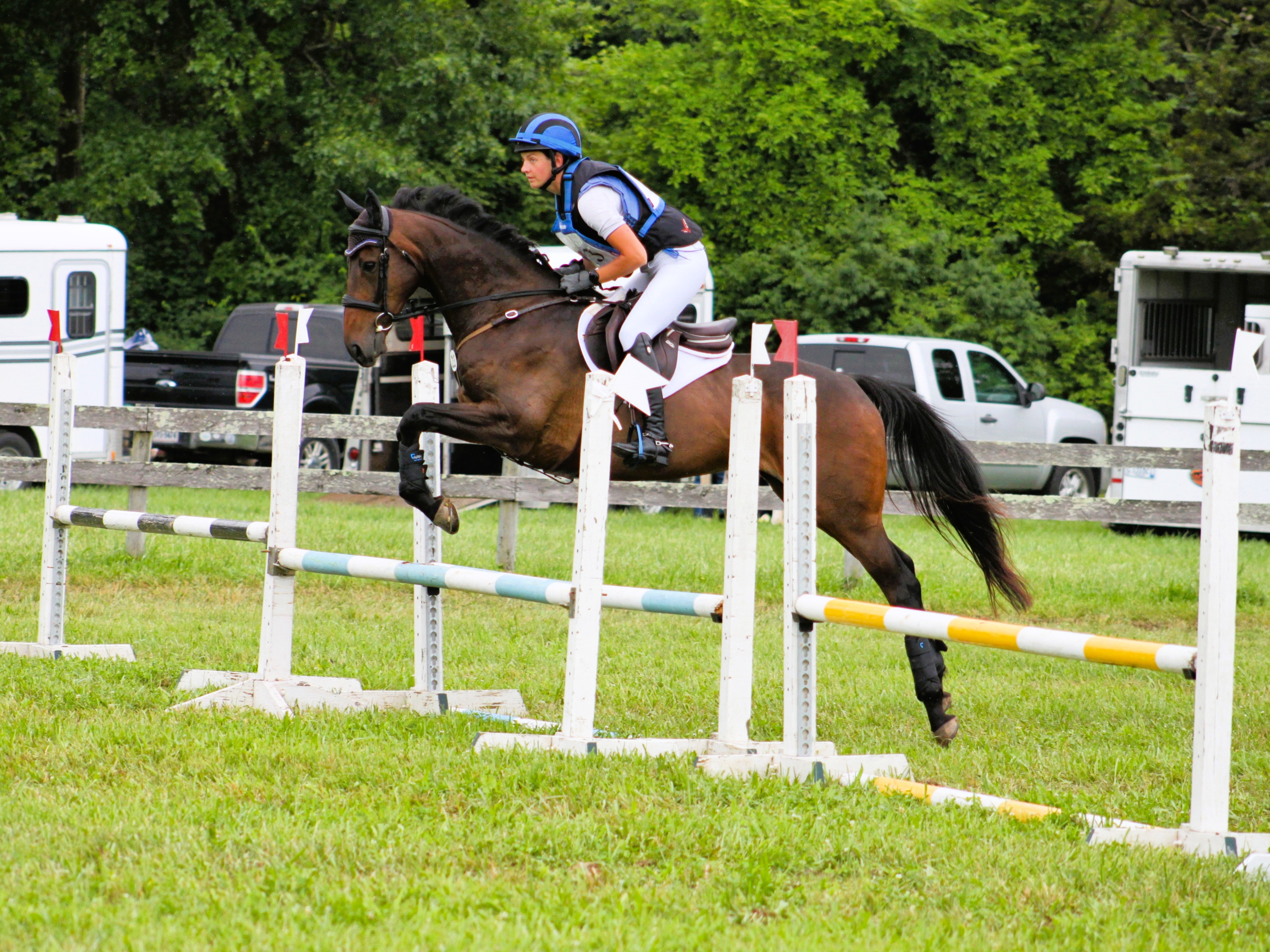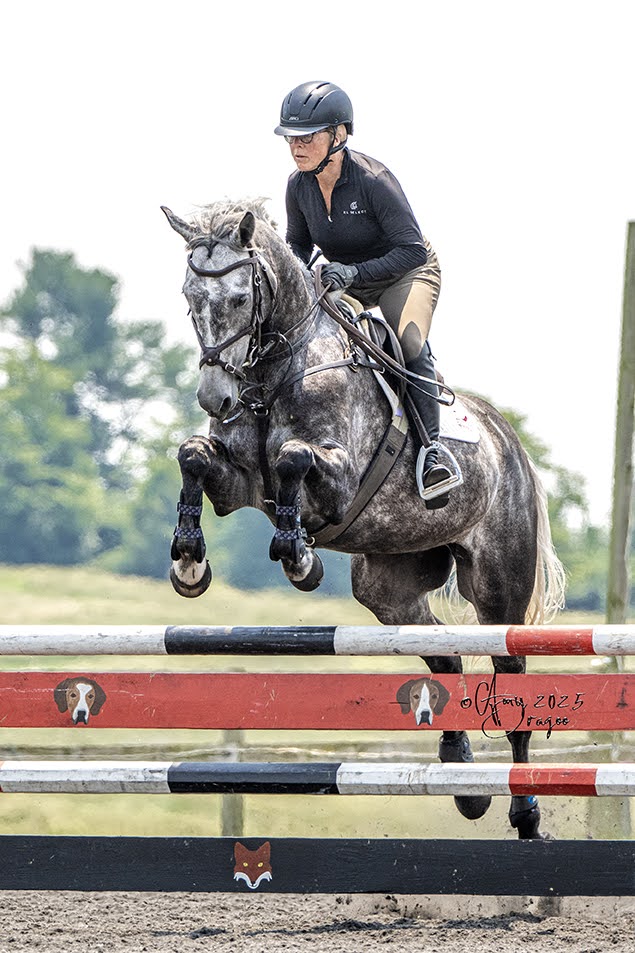
FMFEF Board Members (L to R: Katrina Davis, Chris Lindsay, Christine Hryzak, Stephen Fulton, Karen Fulton, Ashley Pearman, Jeremy Scott, Grace Fulton); also pictured: Dylan Vancamp)
Tucked into the rolling hills of Finksburg, MD, Full Moon Farm has been a local mainstay in the Mid-Atlantic equestrian scene for over 30 years. Known for its warm welcome and grassroots focus, the farm has long provided a launching pad for riders of all backgrounds. Now, through the creation of the Full Moon Farm Eventing Foundation (FMFEF), the Fulton family is working to ensure that horses—and the sport of eventing—are not just available to the few, but truly accessible to all.
The foundation, launched officially in 2024, is the culmination of a decades-long dream for farm owners Karen and Stephen Fulton. “We’d kicked the idea around for about 30 years,” Karen explains. “After COVID, and with everything happening in the world, it just felt like the right time. Horses are good for people—period—and we wanted to make sure that everyone who wanted a path into this world had a way in.”
That mission, Karen says, has always been at the heart of Full Moon Farm’s operations. The farm welcomes a wide range of students across socio-economic backgrounds, and their thriving lesson and lease program has introduced hundreds of young riders to horses without the need for ownership. Formalizing their inclusive ethos into a nonprofit was a natural next step.
FMFEF was built around three pillars: to promote good horsemanship, to prevent marginalization, and to foster diversity, equity, and inclusion in equestrian sport. While the foundation’s name includes “eventing,” its scope goes far beyond competitive goals. “We don’t just want to support riders who look a certain way or ride at a certain level,” Karen says. “We want to help anyone with financial need, anyone who wants to be part of this world—whether that’s in the saddle or behind the scenes.”
One of FMFEF’s most ambitious early goals was to establish a national award through the United States Eventing Association (USEA) that would support riders from underrepresented or underserved backgrounds. In order to create an ongoing award—rather than a one-time grant—the foundation was tasked with raising $25,000 in seed funding. The USEA invests this amount, guaranteeing that the award can be given annually for years to come.
Raising that amount would be a stretch for any new organization, let alone one operating just months into its existence. But the FMFEF team took the challenge head-on. “It was a little bit of a ‘go big or go home’ moment,” Karen says. “We want to be part of building a wider base for the sport, and this felt like a way to put our money where our mouth is.” At the time of this writing, the foundation has already surpassed $20,000 in donations—well ahead of schedule.
While the national grant may be the marquee project, FMFEF’s impact is felt most directly in its local community. Each summer, the foundation offers fully-funded scholarships for youth riders to attend Full Moon Farm’s popular camps. “Horse camp is expensive,” Karen says. “Even for day camp, it adds up quickly. This is a way we can bring in kids who might never have had the opportunity otherwise.” FMFEF partners with local organizations such as Sub Scholars to identify scholarship recipients, and plans to expand the number of supported campers in the future.
Fundraising efforts have been woven into the existing rhythm of life at the farm. The annual Derby-Cross, held just before a recognized horse trials, doubles as a fundraiser—and a fan favorite. “People like feeling like they’re getting something for their money, not just writing a check,” Karen says. “And we’re already setting everything up for the horse trials anyway, so it works.” Community outreach extends beyond the farm gates, too—especially when it involves Oliver, the foundation’s beloved miniature horse. Outfitted in a rainbow-trimmed blanket bearing a QR code, Oliver is a frequent visitor at farmers markets, local festivals, and Pride events, where he serves as both mascot and walking donation box.
The foundation also prioritizes educational outreach, with a focus on inclusion. This June, FMFEF will host a virtual panel discussion titled “Navigating the Horse Industry as Trans and Queer Equestrians.” Moderated by Emily Jacobs, a longtime community member and former Navy officer, the panel aims to offer a space for shared experiences and practical guidance, both for LGBTQ+ riders and for allies hoping to foster safer, more welcoming barns. “These are people who have been part of our community forever,” Karen says. “We just want to make sure they know they’re seen and supported.”
That sense of belonging has long been baked into the culture at Full Moon Farm. “We always tell people—there are plenty of great places to ride. But if you don’t treat people right, you’re not going to be welcome here,” Karen says. “We’ve got kids and grandkids growing up at this farm. It’s our home.”
Karen recalls one of the early community forums the foundation held in 2024, where a young rider—someone who had grown up at the farm—shared for the first time what it had meant to navigate the space as a queer teen. “I’d known this kid forever, and it just never occurred to me,” Karen says. “But it was so powerful to hear how hard it had been sometimes. Not because anyone meant to be hurtful, but just because we weren’t thinking.”
Those stories sparked a series of listening sessions and informal trainings—led by board member Katrina, who works in HR professionally—designed to help the FMF community better understand the lived experiences of its members. “No one wants to make someone feel uncomfortable,” Karen says. “But if we’re not aware of what someone else is carrying, how can we help lighten the load?”
That commitment to awareness and education is also reflected in the farm’s riding school model, which serves as the true backbone of Full Moon Farm. “We’ve always believed in starting from the bottom,” Karen explains. “You come for a birthday party, you take a couple lessons, maybe you lease a pony, maybe you join an equitation team.” With a stable of 60 horses and a staff committed to developing riders at all levels, FMF makes it possible to ride—really ride—without needing to own a horse.
That model feeds into the Foundation’s goals too. Many of the farm’s students go on to volunteer as jump judges, scorers, ring crew, and course decorators. “It’s a full-circle process,” Karen says. “You start out as a camper, and maybe one day you’re helping judge a horse trials. That kind of engagement is what keeps the sport alive.”
Full Moon Farm’s calendar reflects that same holistic mindset. In addition to three annual recognized events—April, June 29, and fall—the farm also runs unrecognized schooling shows, summer clinics, and youth programs. New for 2025 is a USEA Young Event Horse Qualifier scheduled for June 30, added to address a lack of local qualifiers prior to the July rule changes.
This week also saw the return of FMF’s summer clinic series, with horsemanship sessions led by Michael Aloisi, jumping days with Woodge Fulton, and cross country schooling with Christine Hryzak. While many sessions are already full, auditing opportunities remain—and proceeds will support FMFEF. The full calendar of events on the docket can be found here.
The foundation’s work may be just beginning, but it has already built a groundswell of support. That, Karen says, is proof that the sport is ready to grow. “Horses don’t care what pronouns you use or what’s in your wallet,” she says. “They care if you bring carrots. And we want to make sure more people get the chance to show up with a pocket full of carrots.”
For more information about FMFEF, upcoming events, or how to donate, visit the FMFEF website here.























